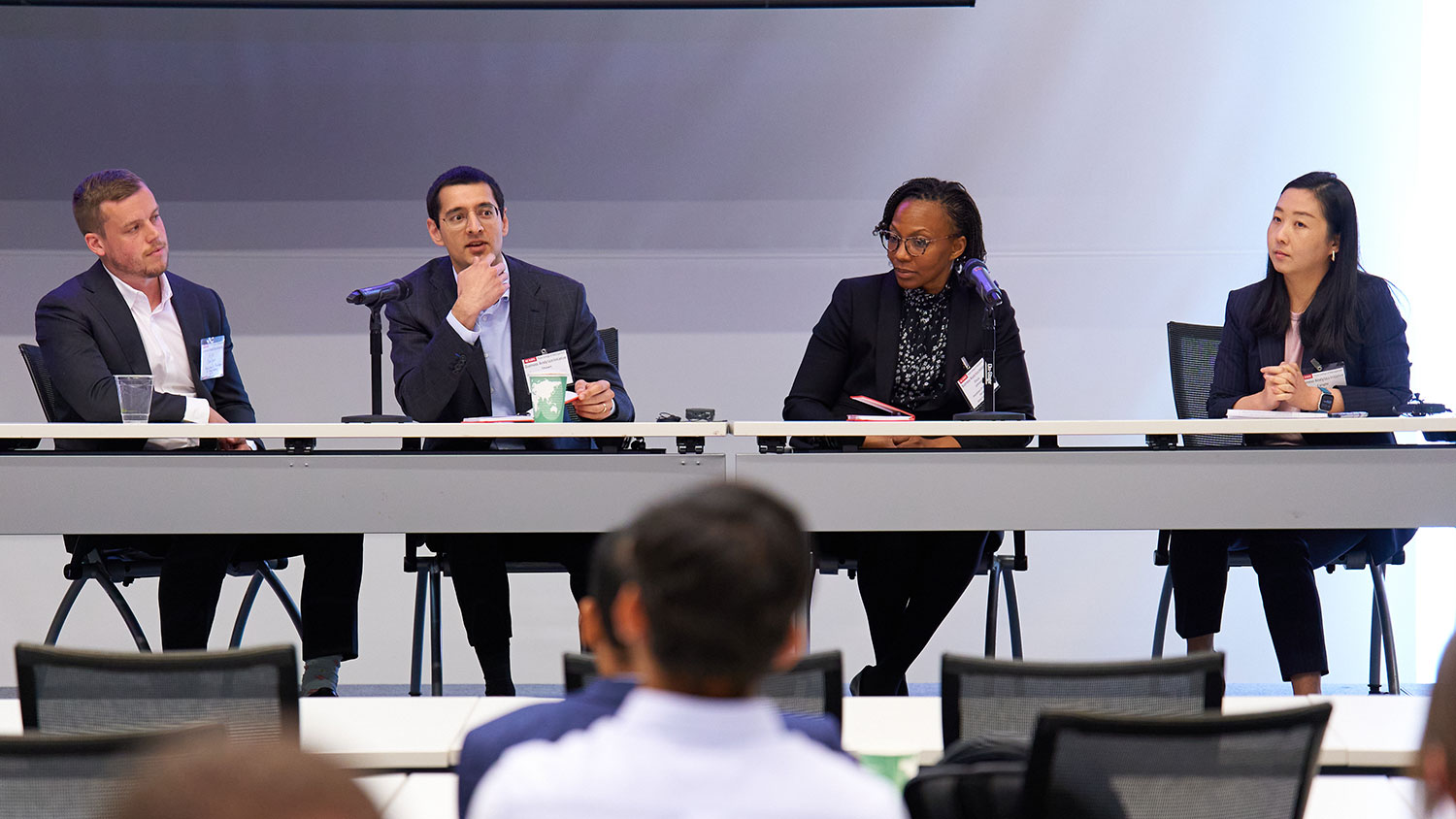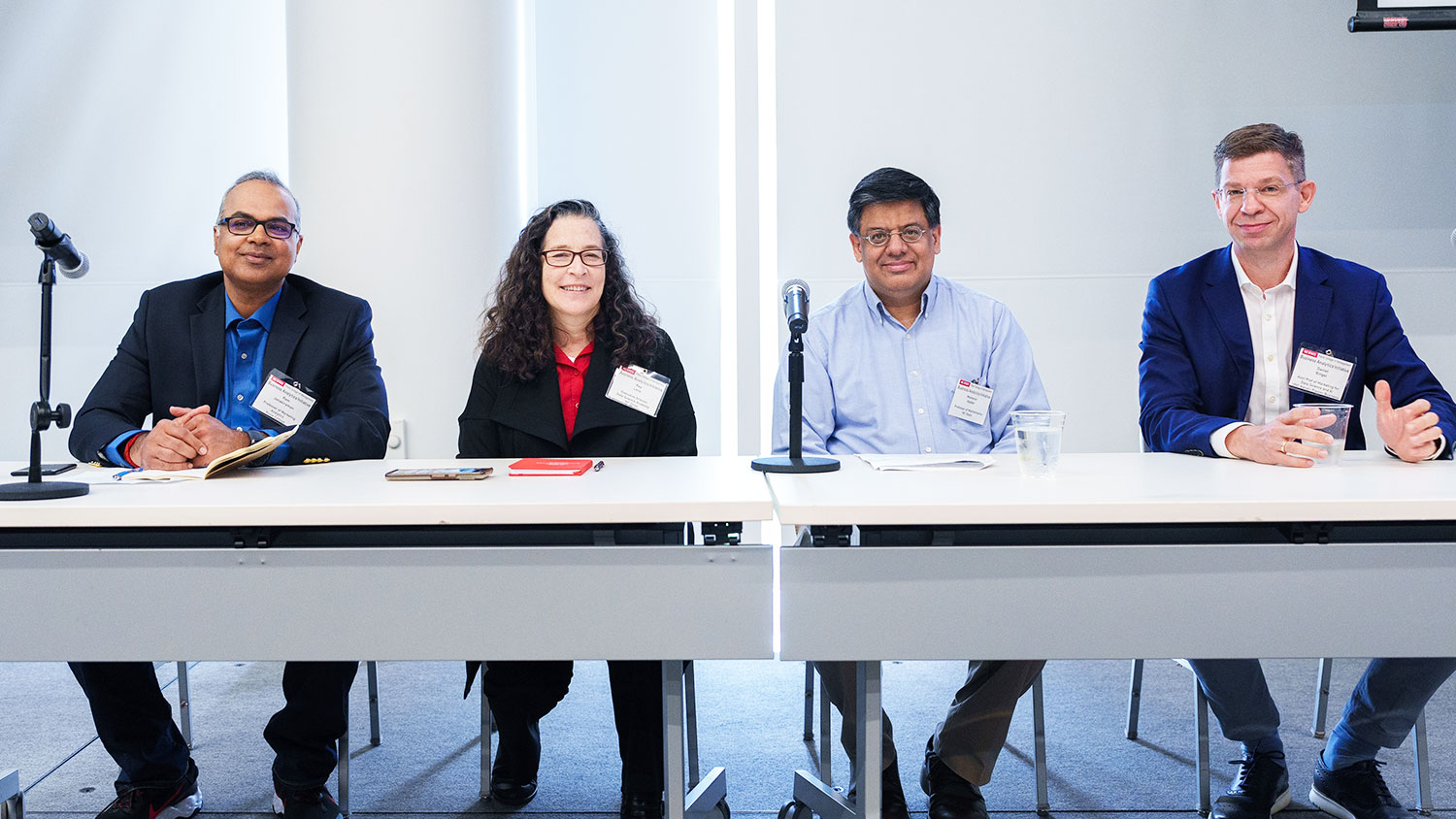Poole College Hosts Business Analytics Roundtable
Police presence, minimum wage and self check-out: Experts examine a wide variety of issues through a data analytics lens at the college's second annual Business Analytics Roundtable.

— Caroline Barnhill
Can smartphone location data inform policing policy reform? How are point-of-sale analytics shaking up the retail landscape? Does an increase in minimum wage help or hurt workers? Those were just a few of the topics discussed at the second annual Poole College of Management Business Analytics and AI Initiative’s (BAI) Roundtable.
On April 26, more than 100 students, academics and industry professionals came together to share emerging trends in business analytics, generate ideas and enable connections for the future.
“Our goal is to make this annual event a real value-add to our students by bringing in academics and industry leaders to show how they are using data analytics in the real world,” says Kristin Siebenaler, BAI director.
The event, held at NC State’s Hunt Library, is the BAI’s flagship thought leadership event. In order to facilitate student attendance, the event was scheduled on an NC State “reading day,” which allowed students from the college’s Business Analytics Honors Program, Jenkins MBA Program and MMA (master of management, marketing analytics) Program — along with other undergraduate and graduate students studying engineering, statistics and computer science — to participate.
Retailers tapping into the power of analytics
Kirk Goldman, vice president of business strategy at Toshiba Global Commerce Solutions, opened the conference with a keynote presentation on how retail is transforming due to the macro forces of the digital boom and labor shortages.
“We are incorporating data analytics into everything we do. Take ELERA, Toshiba’s latest point-of-sale solution,” Goldman says. “Among other functions, ELERA uses produce recognition to make self-checkout smarter. Scanning produce is a common pain point for customers. They might not know what kind of apple they’re scanning or remember if they grabbed an organic or regular banana.
“Then there’s the issue of theft — someone putting a steak on the scale but entering it as a banana before putting it in their bag,” he says. “We assumed this produce recognition feature would have the largest impact on theft, but we’ve actually found it’s even more effective in improving the customer experience and reducing check-out times and customer errors, which ultimately leads to more accurate inventory counts.”
Data science and societal issues
Goldman’s keynote presentation was followed by an academic panel discussion on how different faculty members are using analytics to gain a better understanding of societal issues.
Moderated by Fangfei Guo, Poole College assistant professor of marketing, the panel included Elicia John, assistant professor of marketing at American University’s Kogod School of Business, Shawn Mankad, assistant professor of analytics at Poole College, and Gijs Overgoor, assistant professor of marketing at Rochester Institute of Technology’s Saunders College of Business.
“Data can be an objective way to help us have conversations around charged topics. Analytics helps distill perception versus fact.”
Elicia John began the panel discussion by walking participants through her recent research that examined whether smartphone location data would reveal neighborhood-level racial disparities in police presence. Using anonymized smartphone location data between February and November 2017, John found that police time was often significantly higher in mostly Black, Asian and Hispanic neighborhoods versus white neighborhoods.
“Some, but not all, of these disparities may be explained by the demand for police presence in those areas, but we found that the disparities are more pronounced in Black neighborhoods — and that they are associated with stops and arrests,” she says. “With hot-button issues, people might have strong opinions on either side. Data can be an objective way to help us have conversations around charged topics. Analytics helps distill perception versus fact.”
Mankad, who shared his research on whether an increase in the minimum wage actually helps or hurts workers, agreed. Mankad’s study followed a company in California that increased its hourly wage from $11 to $12. His research found that while the workers experienced a higher wage, they actually experienced a net loss in total wage compensation through a reduction in benefit eligibility and a loss in consistent work schedules.
“As a statistician, there is a lot of debate on which statistical models are ‘right.’ Business analytics and machine learning are nonparametric — it doesn’t require any assumptions about the underlying process and helps avoid the dogma that exists in the field. Machine learning is predictive and actionable in real time,” he says.
Using data to create a competitive advantage
Shifting back from societal issues to business insights, during the BAI Roundtable’s second keynote address, Daniel McCarthy, assistant professor of marketing at Emory University’s Goizueta School of Business and founder of Theta, discussed predictive models of customer-based corporate valuation in his presentation titled, “How to uncover the health of your business through the health of your customers.”
He is focused on is helping companies figure out how to leverage transactional data to show how it links to overall corporate valuation.
“There are a few ways to measure corporate valuation,” McCarthy says. “The traditional view is that if the cash return outweighs the cost of capital, a company has a strong corporate valuation. The venture capital mentality is that growth — especially fast growth — equals value. I’m somewhere in the middle of those, meaning that if a company isn’t currently profitable, there needs to be incremental profitability along with future profitability.”
McCarthy believes there need to be predictive models for acquisition, retention, ordering and spend to give an accurate picture of future revenues.
“You need the right data, the right definitions and the right prediction models in order to accurately measure corporate valuation,” McCarthy says.

Closing out the event, Scott Anderson, CEO and founder of Alliance Sales & Marketing, Arthur Bergens, CEO of Bell & Howell, and Brooks Deaton, managing director of NASCAR, provided their unique insights into how their companies utilize data analytics to give them a competitive advantage in the marketplace.
The resounding theme?
Data enables businesses to be stronger, smarter and faster – in real time. And the demand for talented individuals who know how to gather, analyze and create actionable insights into data is only growing from here.
“Our goal, through all our analytics programs at Poole College, is to equip the next generation of business leaders with the knowledge and skills necessary to leverage data to make informed decisions and bring real value to the companies and organizations they join,” says Bill Rand, executive director of the BAI and McLauchlan Distinguished Professor of Marketing. “The BAI Roundtable is one of the compelling ways that we connect what our students are learning in the classroom with what’s happening in the professional world.”
- Categories:


